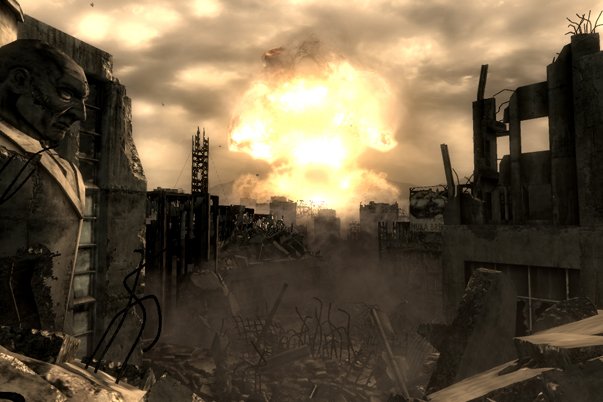Are developers even listening?
Is your voice being heard by the people that make games? We find out...
Bethesda Softworks
GR: Firstly, what's your name and job role, and are you on the frontline of community relations?
Matt: My name's Matt Grandstaff, community manager at Bethesda Softworks. Since my first day of work, Todd Howard has referred to me as the bullet shield in Counter-Strike...so yeah, I guess that makes me the guy on the front line.
GR: Do developers really listen to gamers? Or should gamers stick to gaming and leave developing to developers?
Matt: The folks at our office definitely listen to what the fans have to say. On any given day, you'll even see devs actively participating in discussion within our own forums or commenting on our blog. Additionally, I spend a lot of my time informing guys of any feedback, good and bad, that I feel the developers should be aware of.
GR: How valuable is it to Bethesda to have a lively, well established community? What are the real gilt-edged benefits?
Matt: It's definitely something we value. From our community, we get tons of great feedback and insights on what they like to do and what they’re looking for. The mod community is always a source of great ideas and we have people on the dev team we found through the mod and fan community.
GR: How much attention do Bethesda give to the opinions/suggestions of people beyond your own dedicated community? Do you spend significant time sifting through a broad selection of gaming forums?
Matt: I think it's a pretty significant chunk of time. On my end, I'm trying to find out as much as I can about how gamers feel about our games - whether it's in game-specific fansites or general gaming communities. Equally as important, I like to see what kind of feedback folks have on other games, so we can learn what gamers think other companies are doing right or wrong.
GR: Have ideas generated within the community - on your own forums, for example - ever made it into your games?
Matt: Definitely. With Fallout 3, we ran acommunity contest allowing one fan's 'perk'to be included in the game. In another instance, this past summer I saw a huge demand for modding tools for Star Trek: Legacy and talked to some of our producers on that game about it. We had guys here volunteer to put together scripting tools during their free time so we could release them for the community to use. Beyond that we obviously get an awful lot from people on the forums when they actually get to play our games and provide feedback on that experience. That’s always important for us as we look to what we want to do in our future games.

Above: Fallout 3 will feature the Grim Reaper's Sprint perk, the winning entry of a community competition that attracted around 17,000 submissions
GR: How are ideas/suggestions offered within the community relayed to the rest of the team for consideration? Do you have dedicated meetings for that kind of thing?
Matt: Generally I pass on these ideas either face to face with individuals at the office, or simply send an email over to the appropriate person. For instance, we've had some recent discussions about the Pip-boy 3000 diary Istvan Pely wrote for our Fallout 3 website. When I see interesting feedback about the Pip-boy, I try to loop in Istvan so he knows what folks are thinking.
GR: Does community feedback genuinely help to make better games? Has the industry as a whole benefited from the rise of communities?
Matt: I believe it does. With online gaming communities being as vocal as they are, developers can't help but be cognisant of what people think they're doing right vs. what they're doing wrong. I think our team learned quite a bit from feedback we've received from Oblivion, and folks will see how we've responded in Fallout 3 and in future games. The feedback we get in all its forms from the community only furthers our ability to understand what worked and what didn’t work so that we can do better next time.
GR: After a game is released and in the hands of gamers, what feedback is more important to Bethesda - what the community/forums are saying, or the opinions of professional reviewers/critics?
Matt: I think both are important in their own way. A reviewer is out there letting folks know what they think of what we’ve done, and if people are making a decision as to whether or not they should buy/play our game, that’s certainly important to us as those folks aren’t just reviewers, they’re gamers. They play lots of games, and we want people who play a lot of games to like and play our games, whether they write a review afterwards or not.
Community feedback is a different kind of feedback. It’s more of an on-going thing as those folks are much more likely to delve deeper into the game, find things most other folks don’t, and so forth. The feedback will run the whole gammut, but overall it’s important to us to hear what they think about the game, see what kinds of things they’re talking about, what kinds of mods they’re playing, and so on.
GR: Hypothetical question: If you decided to trash all your community support tomorrow, do you think it would affect the sales of your games?
Matt: Of course it would. Last year Time Magazine voted "You" the Man of the Year because of the power that social networking, blogs, and word of mouth have in society today. If we trashed community support, certain some number of folks would move on to buying games from a different company.
GR: So without a community, Bethesda would be...
Matt: …just another town in Maryland.
Bethesda really does listen! So get yourself involved on the Bethesda community forums and make yourself heard.
Weekly digests, tales from the communities you love, and more



